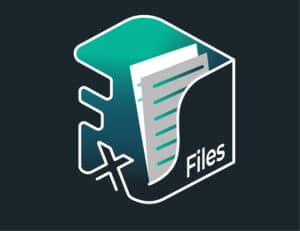Originally published at: Could a Boring File Manager Utility dApp be the Ultimate Key to Web3 Mass Adoption? - FX.land - Decentralized cloud alternative
With the ever present possibility of your laptop dying before you’ve backed up your files, you may experience thoughts like, “where are my duplicates”, “who has my files, and who can see them”, “are they safe”, and the ever important question, “are they stored forever?” These are pragmatic thoughts to have percolating through your brain, but storing important files is only one-half of the equation. You also have to factor in file retrievability when exploring the decentralized storage equation. One should also be asking, “will I be able to retrieve them if I run out of fiat, cancel my subscription, lose my account access or max out my credit?” and with emerging tokenized and paid storage offerings we must crucially ask , what if I run out of token or time?
People want forever storage o f their important files, and look to those storage providers that can provide data security and assurance that there is ‘continuity’ baked into the plan. Digital consumers don’t want to need contingency plans for when that data storage ‘contract or service’ has reached its limit. That is where FxFiles by Functionland comes in, a free, secure decentralized, file manager that makes porting files between devices, computing paradigms and ecosystems a cinch.
f their important files, and look to those storage providers that can provide data security and assurance that there is ‘continuity’ baked into the plan. Digital consumers don’t want to need contingency plans for when that data storage ‘contract or service’ has reached its limit. That is where FxFiles by Functionland comes in, a free, secure decentralized, file manager that makes porting files between devices, computing paradigms and ecosystems a cinch.
In this piece we will examine a few of the centralized file manager options that consumers and enterprises have available to them today, and how the conversation is evolving. We will take a look at some hot button topics being looked at by decentralized storage networks surrounding user adoption of web3 storage products. We will then see how these proposed barriers to product mass adoption can be remedied through removing friction by abstracting away the technical difficulty and providing superior UI/UX. Last but not least we will introduce FX Files, the mobile native, IPFS-based, decentralized file manager dApp. We will round out the discussion by examining how a file manager dApp like FxFiles, which facilitates file backup and migration to decentralized storage, provides the ultimate abstraction layer and ultimately lead to web3 adoption of decentralized compute infrastructure.
Centralized vs decentralized file management solutions
What centralized file manager options do consumers have today? File managers are a bigger deal than you think. On the mainstream, big tech side, there is Microsoft OneDrive, Samsung MyFiles, Files by Google, and Dropbox. Microsoft OneDrive, Samsung MyFiles and Files by Google have in excess of 1B downloads each and with price points that are nothing to sneeze at. There are an additional 173M users of non mainstream file manager and Web2 File Utility Apps today including File Manager by Smart Tool Pro, X-plore File Manager by Lonely Cat Games, Cx File Explorer and File Manager by Maple Media, that have more than 10M downloads each. Our favourite Web2 File Manager alterative to the Bigtech options is AmazeFile which has a fierce and loyal user base of over 1M users.
When it comes to Web3 oriented File Manager providers trying to upend these big competitors, we see some strong contenders such as Filecoin, Storage, Filebase, Pocket Network, and Jackal entering the space at competitive storage price points. We must not forget the web2.5 or big tech alternatives such as Wasabi (which is 1/5th of the price of AWS S3), Backblaze and Digital Ocean which could still give Web3 companies a tough time competitively in the short run. Beyond the storage needs of web2 enterprises and transitioning consumers, there are also Web3 projects that need access to decentralized storage to service their user base, and these include data oracles, such as chainlink, and data unions and marketplaces such as the Streamr network, and Ocean Protocol. This is where Functionland’s suite of IPFS based software protocols come into the picture. For the purposes of this article we will focus on FxFiles which facilitates file backup and migration to decentralized storage and provides the ultimate abstraction layer.
What are some big thinkers at the table asking about file storage and management?
Decentralized storage hardware and protocol builders, Seagate, EY and AMD have recently joined Protocol Labs and Filecoin Foundation to launch the Decentralized Storage Alliance to address barriers to adoption by web2 Enterprises with large storage needs. On the more B2C or peer to peer side of things, projects such as Arweave, Filebase, and again Filecoin, are looking at how friction in web2 to web3 adoption can be minimized. All parties see abstracting out the technical and difficult parts for users as a key starting point, as factoring in unique content IDs, pinning services and similar can be complicated and inconvenient for those used to the fluid ease of web2 cloud computing. This was evident in a recent twitter spaces featuring Filecoin, Arweave, Consensys Systems, FileBase (of which Zac Cohen is an advisor to Functionland), and Functionland advisor, Stefaan Varveat from Protocol Labs. During the live Twitter Spaces, Maggie Love of co-founder of @W3BCLOUD (compute & storage infrastructure for web3) and founder of @She__Fi , set the stage for cutting edge dialogue among the notable guests and provided thought leadership from her perspectives as a decentralized storage miner and developer advocate. The Arweave team shared updates on their long-term data storage technology, where there is a one time cost to store your data for over two hundred years. The short and long-term cost of file storage is one of the most important considerations in the minds of potential adopters, but ease of use is just as critical if not more for driving adoption of decentralized storage and compute. You can learn more about their decentralized storage Arweave offers, including Ardrive.io
What will be key for mass adoption and removing friction
As Web2.5 and Web3 storage offerings strive to offer hot vs cold storage offerings at all different price points, replacing the cloud still means beating the latency and retrievability consumers are used to in the current web2 computing paradigm. Consumers are used to not only storing their files conveniently in the cloud, but they have become accustomed to the convenience of accessing and collaborating on files in the cloud using tools SAAS products like dropbox, google photos, google files, and environments like Microsoft teams. Users ultimately care about file retrievability and easy access as much, if not more than file storage itself, which we know all comes down to UI/UX.
There is a need for an abstraction layer that removes the technical hurdles to adoption. Mass adoption is hampered by the need for adopters to know things about Content IDs, and pinning services in order to store or interact with their own files and digital assets. There is also a lack of file Indexing, and enhanced search capabilities, such as the ability to search your photos by face, like we are used to, is still under development in accordance with privacy by design guiding the work of multiple teams in the space. The evolving needs for CIDs and pinning services, and the need for well developed content delivery networks (CDNs) are keeping decentralized storage networks on their toes.
While billions of users continue to rely on Microsoft OneDrive, Samsung MyFiles Files by Google, over 170M users have download alternatives to bigtech File Manager System offerings to help find, manage and migrate files between devices and storage locations. These users seek to find duplicates, search by thumbnail, file size, or when last modified, and they hope these solutions can help address the issue of ‘storage islands’. Could File Management tools like FxFiles, which have millions of daily active users be a tool or low ’hanging fruit’ that can facilitate mass adoption?
 Introduction to FxFiles a File Manager that serves as a gateway to Web3
Introduction to FxFiles a File Manager that serves as a gateway to Web3
FxFiles by Functionland, is an open source local file manager. If connected to Functionland’s hardware via the $Fula network, it stores the files in a decentralized network of validated storage providing nodes. Fx Files uses ipfs based protocols from Protocol Labs to offer decentralized storage. You can find FxFiles in the Google Playstore and on the Microsoft Webstore. Some of the new and exciting features of FxFiles include “FX Connect” which lets use transfers files from phone-to-phone with Wi-Fi Direct. FxFile also supports NFC to connect two phones by physically touching their backs together (requires FX+)! Last but not least, “Web Access” which enables transfer and management of files and media from your computer’s web browser and even lets you can drag-and-drop!
Adoption of decentralized storage solutions starts with a seamless user experience
A File Manager with a decentralized backend that lets you sort your thumbnails by date modified, like you always have is potentially a quick path to web3 adoption. File managers are a bigger deal than you think and could reach a wider and more nuanced audience than gaming of nfts can afford. People will be far more inclined to use decentralized storage products when they are no longer burdened with the need to connect disjointed wallets for access, provide or find unique content IDs, or remembering to pin their favourite file for quick retrieval. We have touched on what decentralized cloud storage companies like Consensys Systems, Filebase, Filecoin, and Arweave express as hurdles to adoption for non-technical users. Lastly we covered how a product like Fx Files could be key for mass adoption and removing friction for users who have reached a limit when it comes to the cost and lack of control over storing their own files and data. You can find FxFiles in the Google Playstore and on the Microsoft Webstore, we would love to get your feedback on this revolutionary dApp and our thesis on web3 adoption!
If you’d like to learn more about Functionland, you can visit our website. The FxFotos app is available in the Google Play and Apple App Store. There is also a file manager app called FxFiles, and plans for an identity/password manager app as well!
